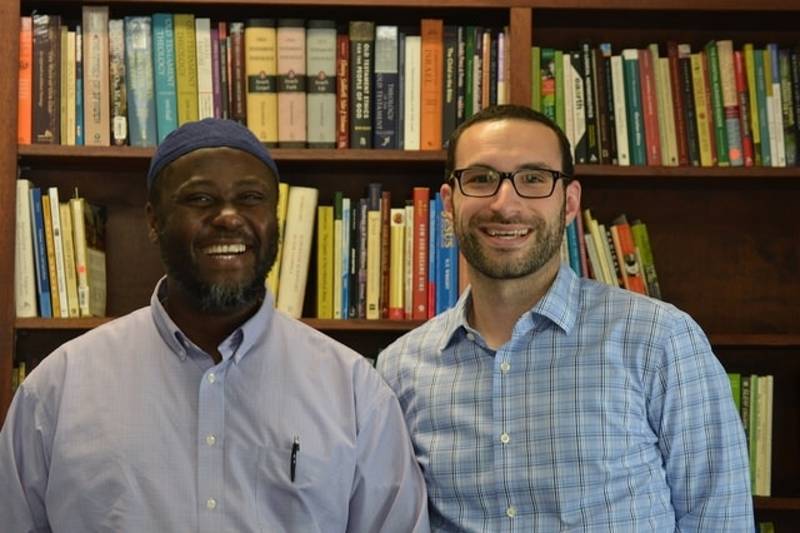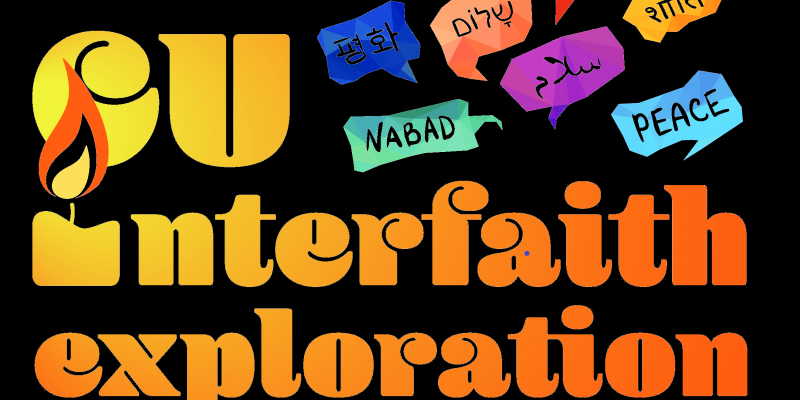Since I launched this “When Faith Speaks” Series in late summer, it has continued to reveal new paths of inquiry.
In this case, after the interview with Rabbi Alan Cook, he suggested that I speak with Reverend Michael Crosby from the First Mennonite Church of Champaign-Urbana about CU Interfaith Exploration: Cultivating Hope In Anxious Times, a series of fall events being sponsored by the Interfaith Alliance of Champaign County.
The following interview is just a portion of the conversation Rev. Crosby and I had in early September 2019 about the Cultivating Hope schedule of events and the complexities of interfaith/intrafaith work. Given the rise of anti-Semitic incidents at UIUC in recent weeks, the conversation and upcoming Cultivating Hope weekend couldn’t be more timely.
And yet, there are other persistant local issues that also require our attention. Below is the abbreviated account of our grappling with these very challenging issues.
 Reverend Michael Crosby, pictured with Imam Sawadogo Ousmame of CIMIC. Photo by Addison McClure.
Reverend Michael Crosby, pictured with Imam Sawadogo Ousmame of CIMIC. Photo by Addison McClure.
Smile Politely: How did this “Cultivating Hope In Anxious Times” weekend originate?
Reverend Michael Crosby: This church has had a lot of formal and informal interfaith connections over the last 20-30 years between my congregation, First Mennonite Church of Champaign Urbana, and Central Illinois Mosque and Islamic Center, the UIUC Department of Religion faculty, and the Interfaith Alliance of Champaign County.
Also, Ted Schwartz, of the theater group Ted & Company is an individual with a lot of connections to the Mennonite Church. Ted does really great work using satire and humor as a vehicle for introducing difficult subjects through theater in ways that get people engaged and thinking. He published a book a few years ago called “Laughter Is Sacred Space.”
One of his plays, “How To Buy An Enemy” is a play that he developed to explore 9-11 issues. He had expressed an interest in rewriting the play to incorporate more contemporary issues to examine racialization, patriarchy, and heterosexism.
So, a group of clergy and University faculty and staff worked with Ted on updating the script and we decided that we wanted to invite Ted and Company back during the fall of 2019 to do the play and promote the production campus-wide. The Department of Religion faculty also reached out with some lecturers that they wanted to invite to campus during the same time. Sinai Temple and CIMIC also agreed to host some panels and meals in their spaces as well. Thus, these diverse offerings grew into a weekend of programming and we also garnered grant funding to support the activities.
Following the event, we will also be connecting students with local houses of worship outside of their own traditions for worship experiences and/or community service experiences.
SP: Who do you want to attract to this weekend of programming?
Crosby: There are two answers to this question that reflect our interest in attracting both campus and the wider community.
On campus, the best answer is students. Students who are connected to their faith communities and an important expression of their public life and social engagement. We also welcome students with questions and we welcome students with questions about how their faith does and does not relate to other faith traditions. We are trying to encourage curiosity and we welcome the curious.
Additionally, U.S. society has an amazing habit for segregation that keeps us so far from the people that have the most to teach us about life. So, we hope our goals are broad enough to attract a broad audience.
We also have a robust network of people in congregations connected to the Interfaith Alliance. So we hope this program will serve as their next level of interfaith engagement.
I hope that we attract a diverse audience. However, I also hope that people who have the most to learn — namely people like me: white, male Christians — come to learn about communities that are often ignored or demeaned or belittled or dismissed in popular media and in our general understanding.
The language that has sat with me the more I do this interfaith work is the language of “affection”, meaning moving beyond tolerance to developing affection for other’s faith traditions and accepting that the differences between faiths actually enrich us and is something that we all benefit from.
The closer I get to the faith traditions different from my own the more I respect the people who practice them and the sense that our community needs all of these different communities in order to take a stab at what it means to be human and share a common life.
SP: Yet, there don’t seem to be African American churches, Latino churches, or Asian churches or faith communities listed as participants in the Cultivating Hope events. Am I correct to understand that these groups are not typically involved in the Interfaith Alliance of Champaign County?
Crosby: Yes, you are correct. That has indeed been a challenge for the Alliance. And we do spend time talking about it.
SP: I mean, I understand that is more of an INTRA-faith issue than an INTER-faith issue.
Crosby: No, you are right to mention it. And if I am really being honest, another group that is not well represented in the Alliance are Evangelical churches. And this is not to put those groups in the same category, but in the midst of talk of diversity, we recognize significant shortcomings in these areas.
Some of us in the Interfaith Alliance have made some efforts to be a part of the Ministerial Alliance of Champaign Urbana & Vicinity, the traditional African American Church Alliance, through some of their gun violence initiatives.
SP: My other question is about the Cultivating Hope objectives stated as “promoting collaborations on significant issues of our time”. Nationally and locally, we continue to grapple with the intersections of race, class, gender and armed violence. So, how will this Cultivating Hope gathering help us address these issues?
Crosby: The title of this weekend “Cultivating Hope In Anxious Times” came from the idea of a series of events designed to build community, make connections, and improve understanding and develop affection at the same time that we see this as a way of capturing ideas about fear of what we don’t understand. Sure, it’s a bit naive to imagine that if we just understood each other’s religions then we would no longer fear each other. I don’t want to fall into that trap because it isn’t adequate. What we want to do is tack xenophobia in a setting where people can actually interact with one another.
SP: As you have identified, getting people in a room together can indeed lessen anxiety, promote friendship, foster connections and create comfort between communities of different faiths and races.
However, where are the ministries that exist specifically for anxious White men?
Crosby: Hmmmm?
SP: As we look at the shootings across the summer 2019 — particularly mass shootings nationally where Latinos in particular have been targeted — there is a whole ministry needed for that work.
Crosby: So are you interested in how a program like this might draw in anxious White men — of which I may or may not be one (laughs)?
SP: Well I am an anxious Black woman (laughing)…so I feel you.
However, I find the interfaith focus a bit ironic — because if we look at this past American summer and over the last few years: Muslims and their faith are not the problem. Jews and their faith are not the problem. White men killing minorities in this country is a SERIOUS problem. Yet, no one wants to focus on white masculinity and / or deadly violence committed by men who identify as Christian.
Crosby: It is important to hear that you are coming at this event through the lense of the summer. We hope this event becomes an annual event so that we can take on additional topics. However, as this is the Inaugural Interfaith Exploration, we wanted to keep the discussion as broad as possible and then tackle more specific themes in subsequent years.
For this event we want to create a context of mutual collaboration and support for one another.
We firmly believe that initiatives like this one help us build a solid community in order to achieve the justice we hope for…so that when violence impacts our communities we are able to say I know you and I’m here for you.
You can find out more about the Cultivating Hope weekend of events here.








